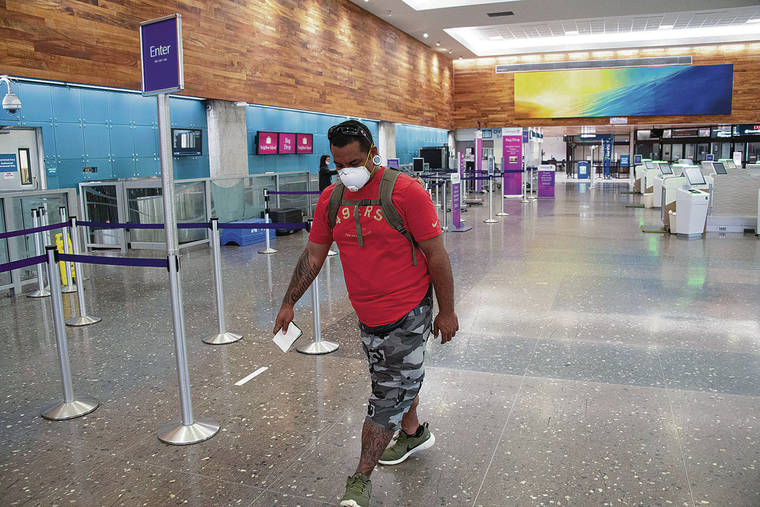Interisland quarantine order empties Hawaii airports

CRAIG T. KOJIMA / CKOJIMA@STARADVERTISER.COM
Ikaika Picanso walked through an empty Hawaiian Airlines terminal Wednesday at the Daniel K. Inouye International Airport to get to his Big Island flight.
It’s a zero-sum game.
The state’s COVID-19 lockdowns, including stay-in-place orders and passenger quarantines, which were expanded to interisland flights Wednesday, hopefully will keep Hawaii safe. However, they’ve collapsed significant aspects of Hawaii’s economy, especially tourism, which at 17% is the biggest piece of Hawaii’s gross domestic product.
Passengers to Hawaii in March dropped more than 98.5% as COVID-19 lockdowns reduced travel demand for the islands. Gov. David Ige instituted a 14-day mandatory self-quarantine for all arriving trans-Pacific passengers on March 26.
Passenger counts will drop even more with the new interisland quarantine, said state Department of Transportation spokesman Tim Sakahara.
While interisland numbers for Wednesday were not yet available, Sakahara said the airport was nearly empty.
“I was at the airport this morning, and it is like I’ve never seen it before — here or at any major airport. There are so few people at the airport.”
Don't miss out on what's happening!
Stay in touch with breaking news, as it happens, conveniently in your email inbox. It's FREE!
At the interisland terminal at Daniel K. Inouye International Airport on Wednesday afternoon, Hawaiian Airlines employees vastly outnumbered passengers.
The quarantines have been largely supported by Hawaii’s visitor industry, but they’ve also accelerated the coronavirus-related downturn. Airlines are scrambling to slash costs and cut seats and hotels have wide swaths of available rooms.
Interisland travel is likely to take a big hit.
As of Wednesday all interisland travelers must fill out a declaration form that they must turn in to a TSA checkpoint prior to departing. The form, which is available at hidot.hawaii.gov/coronavirus/ Opens in a new tab, may be filled out in advance. Travelers must list their phone number and purpose of their trip.
All interisland travelers must self-quarantine for 14 days in their home or hotel. They must remain in their home or hotel rooms, order food delivery and not receive visitors. Essential workers can leave their home or hotel only to go to their job.
“Passengers who are traveling for medical reasons for treatment or to see a specialist should also wear a mask and practice social distancing. If a patient does not have a mask, they can use a homemade mask,” Sakahara said.
Sakahara said essential workers should wear a mask and socially distance themselves while traveling through the airport and on the flight.
While the quarantine orders have essentially halted all tourism and most business travel, hotels are looking for ways to support the community in the fight against COVID-19.
A new program called Hotels for Heroes aims to shore up the industry and the community by compensating Hawaii hotels that provide complimentary rooms for Hawaii’s health care workers and first responders who want to reduce risk for their families or spend the night closer to work.
The program, which was developed by HTA, the Hawaii Visitors and Convention Bureau, and the Hawaii Lodging and Tourism Association, establishes a housing bureau to vet reservations. Hotels with approved reservations will be compensated $85 a night from state tourism funds to provide compensation for the room and limited quarantine protocol services.
Mufi Hannemann, HLTA president and CEO, said in a letter to members, “This is a wonderful way for the industry to continue to demonstrate that despite the challenges we face we are still willing to do our part to help our community overcome this daunting task. Through this partnership we will be able to cover the cost of the rooms for these community heroes.”
HTA CEO and president Chris Tatum thanked hotel general managers across the state in a letter Tuesday for their “efforts to reduce the risk of spreading COVID-19 by encouraging social distancing and the shelter in place directives.”
Tatum said the new initiative would allow hotels to provide, “a valuable option for residents needing to separate from their family, health care workers, and first responders who have worked tirelessly to care for our community.”
Sean Dee, executive vice president and chief marketing officer for Outrigger Hospitality Group, said the company was delighted to place Outrigger Waikiki in the program, which provides short-term housing for Hawaii’s critical first responders, while supporting hotels and businesses.
“Every room night helps to keep our hosts employed in this difficult time as well as provide additional opportunities for food and beverage outlets like Duke’s and the Sunrise Shack to continue to operate and serve their patrons,” Dee said. “It’s heartwarming to see everyone working together to help combat this deadly virus and keep our hosts employed.”
Kelly Kitashima, director of sales for the Residence Inn by Marriott Oahu Kapolei, said the property wanted to do its part, especially because it is one of only three Marriotts still open on Oahu.
“We were already searching for partnerships when we learned about Hotels for Heroes, which is something the industry did on its own to give back,” Kitashima said. “This allows us to help the community, while at the same time gives us the chance to improve our occupancy and bring some of our hourly staff back. We know there’s a need for jobs on the westside.”
Hilton Raethel, president and CEO of The Healthcare Association of Hawaii, thanked the hospitality industry for its support.
“This offer of hotel rooms comes at a time when many frontline health care workers are trying to care for the sick and the most vulnerable among us, even as they try to protect their own families. It is a wonderful testament to the spirit of cooperation and the aloha spirit,” Raethel said.



